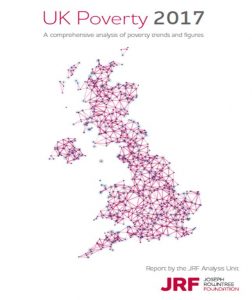With the Poor

 The Joseph Rowntree report “UK Poverty 2017”, spells out that one in five people living in Britain are now struggling to make ends meet. The research found 400,000 more children and 300,000 over 65 year olds now living in poverty compared with the numbers in 2012-3.
The Joseph Rowntree report “UK Poverty 2017”, spells out that one in five people living in Britain are now struggling to make ends meet. The research found 400,000 more children and 300,000 over 65 year olds now living in poverty compared with the numbers in 2012-3.
In other words, the total numbers in poverty according to agreed measures of relative poverty, (defined as someone earning less than 60% of median earnings) are now close to 14 million citizens. These figures mark the first increases in child and pensioner poverty for 20 years. The trends of decreasing poverty from the mid 1990’s are now set in reverse gear.
A third of children were living in families lacking the resources for their minimum needs in 1994/5 and this number fell to 27% by 2011/12 as a result of the introduction of a statutory minimum wage, higher employment rates and the introduction of tax credit top ups for those in low paid work or older people on low basic pensions. Pensioner poverty in that period was reduced from28% to 13%.
The numbers falling into poverty now are the result of reductions in the pension credit and working tax credit top ups. Any tax cut gains are wiped out by benefit support cuts. Now the majority of children classed as in poverty are now in working households in which one or both parents are actually working. In other words, poverty is now the result of low paid work. The poor are working not on the dole. Thus the myth of getting a job as the way out of poverty no longer holds. Work does not always pay. The continuing declared rise in employment is no longer leading to lower poverty. Children living in households in which both parents are in work are the more likely to be poor because of the freezing of wage support benefits as the ‘welfare budget’ is bearing the brunt of the austerity cuts.
In the recent budget the Chancellor reaffirmed that the government is continuing with plans to cut working age benefits by a further £12 billion over the next five years. Given the projections of stagnant wages, reducing incomes and rising prices, the Institute of Fiscal Studies estimates that the number of children living in poverty will rise to 5.2 million in the next five years. Rising housing costs are taking a high proportion of poorest household incomes.
Impossible choices between heating and eating and between parents and children having meals are increasing commonplace as are desperate calls on charitable food banks. Church Action on Poverty provides case studies and ‘voices from the margins’ based on listening to people in poverty for any that doubt their real difficulties in day to day survival. Church Action on Poverty Sunday, to raise campaign funds to enable them to be heard so that things can change, will be on 11 February 2018.
A theologian suggested ‘with’ is the most important word in theology. “Emmanuel”, Advent’s theme, means “God with us”. Pope Francis calls us as Church to be “with the poor” and that must mean changing budgets and low wages that keep them poor.
*****************************************
